Greek and Roman gods
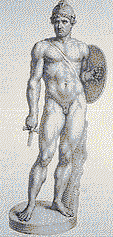 To the left, Ares, the Greek god of war. Not a very nice guy,
all things considering. That's an awefully short (cough) "sword"
he's got there, don't you think? But I wouldn't tell him so to
his face: I might end up in the Elysium Fields or Hades pushing
a stone around for eternity. Ares is the son of Zeus (king of
the gods) and Hera. The Romans identified him with Mars, also a
god of war. Aggressive and sanguinary, Ares personified the
brutal nature of war. He was unpopular with both gods and
humans. Among the deities associated with Ares were his consort,
Aphrodite, goddess of love (see her below somewhere), and such
minor deities as Deimos (Fear) and Phobos (Rout), who
accompanied him in battle. Although fierce and warlike, Ares was
not invincible, even against mortals. The worship of Ares,
believed to have originated in Thrace, was not extensive in
ancient Greece, and where it existed, it lacked social or moral
significance. Ares was an ancestral deity of Thebes and had a
temple at Athens, at the foot of the Areopagus, or "Hill of
Ares." He's also the handsom chap giving Hercules a hard time
in the TV series.
To the left, Ares, the Greek god of war. Not a very nice guy,
all things considering. That's an awefully short (cough) "sword"
he's got there, don't you think? But I wouldn't tell him so to
his face: I might end up in the Elysium Fields or Hades pushing
a stone around for eternity. Ares is the son of Zeus (king of
the gods) and Hera. The Romans identified him with Mars, also a
god of war. Aggressive and sanguinary, Ares personified the
brutal nature of war. He was unpopular with both gods and
humans. Among the deities associated with Ares were his consort,
Aphrodite, goddess of love (see her below somewhere), and such
minor deities as Deimos (Fear) and Phobos (Rout), who
accompanied him in battle. Although fierce and warlike, Ares was
not invincible, even against mortals. The worship of Ares,
believed to have originated in Thrace, was not extensive in
ancient Greece, and where it existed, it lacked social or moral
significance. Ares was an ancestral deity of Thebes and had a
temple at Athens, at the foot of the Areopagus, or "Hill of
Ares." He's also the handsom chap giving Hercules a hard time
in the TV series.
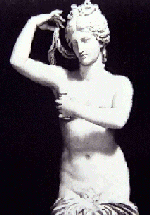
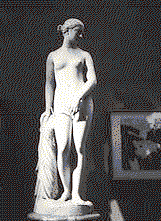 Aphrodite, to the right and left here, is, of course, the
Goddess of Love and sexual desire, though there is an aspect of
her called "She who turns herself away" that is less than
pleasant. Aphrodite was often seen on battle fields, fighting
along side humans at the Battle for Troy. In Homer's Iliad she
is said to be the daughter of Zeus and Dione, one of his
consorts, but in later legends she is described as having sprung
from the foam of the sea and her name may be translated
"foam-risen." In Homeric legend Aphrodite is the wife of the
lame and ugly god of fire, Hephaestus. Among her lovers was
Ares, god of war, who in later mythology became her husband. She
was the rival of Persephone, queen of the underworld, for the
love of the beautiful Greek youth Adonis.
Aphrodite, to the right and left here, is, of course, the
Goddess of Love and sexual desire, though there is an aspect of
her called "She who turns herself away" that is less than
pleasant. Aphrodite was often seen on battle fields, fighting
along side humans at the Battle for Troy. In Homer's Iliad she
is said to be the daughter of Zeus and Dione, one of his
consorts, but in later legends she is described as having sprung
from the foam of the sea and her name may be translated
"foam-risen." In Homeric legend Aphrodite is the wife of the
lame and ugly god of fire, Hephaestus. Among her lovers was
Ares, god of war, who in later mythology became her husband. She
was the rival of Persephone, queen of the underworld, for the
love of the beautiful Greek youth Adonis.
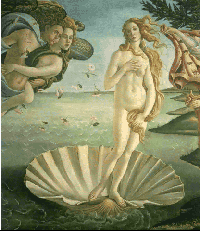 Perhaps the most
famous legend about Aphrodite concerns the cause of the Trojan
War. Eris, the goddess of discord, the only goddess not invited
to the wedding of King Peleus and the sea nymph Thetis,
resentfully tossed into the banquet hall a golden apple, marked
"for the fairest." When Zeus refused to judge between the three
goddesses who claimed the apple, Hera, Athena, and Aphrodite,
they asked Paris, prince of Troy, to make the award. Each
offered him a bribe: Hera, that he would be a powerful ruler;
Athena, that he would achieve great military fame; and
Aphrodite, that he should have the fairest woman in the world.
Paris selected Aphrodite as the fairest and chose as his prize
Helen of Troy, the wife of the Greek king Menelaus. Paris's
abduction of Helen led to the Trojan War. Probably Oriental in
origin, Aphrodite was identified in early Greek religious
beliefs with the Phoenician Astarte and was known as Aphrodite
Urania, queen of the heavens, and as Aphrodite Pandemos, goddess
of the people.
Perhaps the most
famous legend about Aphrodite concerns the cause of the Trojan
War. Eris, the goddess of discord, the only goddess not invited
to the wedding of King Peleus and the sea nymph Thetis,
resentfully tossed into the banquet hall a golden apple, marked
"for the fairest." When Zeus refused to judge between the three
goddesses who claimed the apple, Hera, Athena, and Aphrodite,
they asked Paris, prince of Troy, to make the award. Each
offered him a bribe: Hera, that he would be a powerful ruler;
Athena, that he would achieve great military fame; and
Aphrodite, that he should have the fairest woman in the world.
Paris selected Aphrodite as the fairest and chose as his prize
Helen of Troy, the wife of the Greek king Menelaus. Paris's
abduction of Helen led to the Trojan War. Probably Oriental in
origin, Aphrodite was identified in early Greek religious
beliefs with the Phoenician Astarte and was known as Aphrodite
Urania, queen of the heavens, and as Aphrodite Pandemos, goddess
of the people.
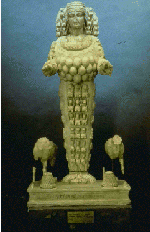
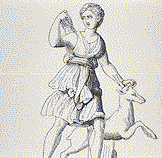 Artemis, in Greek mythology, one of the principal goddesses,
counterpart of the Roman goddess Diana. She was the daughter of
the god Zeus and Leto and the twin sister of the god Apollo. She
was chief hunter to the gods and goddess of hunting and of wild
animals, especially bears. Artemis was also the goddess of
childbirth, of nature, and of the harvest. As the moon goddess,
she was sometimes identified with the goddess Selene and Hecate.
Although traditionally the friend and protector of youth,
especially young women, Artemis prevented the Greeks from
sailing to Troy during the Trojan war until they sacrificed a
maiden to her. According to some accounts, just before the
sacrifice, she rescued the victim, Iphigenia. Like Apollo,
Artemis was armed with a bow and arrows, which she often used to
punish mortals who angered her. In other legends, she is praised
for giving young women who died in childbirth a swift and
painless death.
Artemis, in Greek mythology, one of the principal goddesses,
counterpart of the Roman goddess Diana. She was the daughter of
the god Zeus and Leto and the twin sister of the god Apollo. She
was chief hunter to the gods and goddess of hunting and of wild
animals, especially bears. Artemis was also the goddess of
childbirth, of nature, and of the harvest. As the moon goddess,
she was sometimes identified with the goddess Selene and Hecate.
Although traditionally the friend and protector of youth,
especially young women, Artemis prevented the Greeks from
sailing to Troy during the Trojan war until they sacrificed a
maiden to her. According to some accounts, just before the
sacrifice, she rescued the victim, Iphigenia. Like Apollo,
Artemis was armed with a bow and arrows, which she often used to
punish mortals who angered her. In other legends, she is praised
for giving young women who died in childbirth a swift and
painless death.
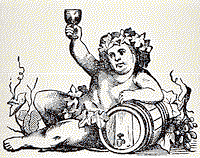
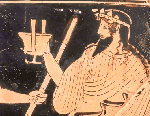 Dionysus, in Greek mythology, god of wine and vegetation, who
showed mortals how to cultivate grapevines and make wine. He was
good and gentle to those who honored him, but he brought madness
and destruction upon those who spurned him or the orgiastic
rituals of his cult. According to tradition, Dionysus died each
winter and was reborn in the spring. To his followers, this
cyclical revival, accompanied by the seasonal renewal of the
fruits of the earth, embodied the promise of the resurrection of
the dead. The yearly rites in honor of the resurrection of
Dionysus gradually evolved into the structured form of the Greek
drama, and important festivals were held in honor of the god,
during which great dramatic competitions were conducted. The
most important festival, the Greater Dionysia, was held in
Athens for five days each spring. It was for this celebration
that the Greek dramatists Aeschylus, Sophocles, and Euripides
wrote their great tragedies. After the 5th century bc , Dionysus
was known to the Greeks as Bacchus.
Dionysus, in Greek mythology, god of wine and vegetation, who
showed mortals how to cultivate grapevines and make wine. He was
good and gentle to those who honored him, but he brought madness
and destruction upon those who spurned him or the orgiastic
rituals of his cult. According to tradition, Dionysus died each
winter and was reborn in the spring. To his followers, this
cyclical revival, accompanied by the seasonal renewal of the
fruits of the earth, embodied the promise of the resurrection of
the dead. The yearly rites in honor of the resurrection of
Dionysus gradually evolved into the structured form of the Greek
drama, and important festivals were held in honor of the god,
during which great dramatic competitions were conducted. The
most important festival, the Greater Dionysia, was held in
Athens for five days each spring. It was for this celebration
that the Greek dramatists Aeschylus, Sophocles, and Euripides
wrote their great tragedies. After the 5th century bc , Dionysus
was known to the Greeks as Bacchus.
Bacchus, in Greek and Roman mythology, the god of wine,
identified with Dionysus, the Greek god of wine, and Liber, the
Roman god of wine. The son of Zeus (Jupiter), Bacchus is usually
characterized in two ways. One is that of the god of vegetation,
specifically of the fruit of the trees, who is often represented
on Attic vases with a drinking horn and vine branches. As he
came to be the popular national Greek god of wine and cheer,
wine miracles were reputedly performed at certain of his
festivals. The second characterization of the god, that of a
deity whose mysteries inspired ecstatic, orgiastic worship, is
exemplified by the Maenads, or Bacchantes. This group of female
devotees left their homes to to roam the wilderness in ecstatic
devotion to the god. They wore fawn skins and were believed to
possess occult powers. The name Bacchus came into use in ancient
Greece during the 5th century bc . It refers to the loud cries
with which he was worshiped at the Bacchanalia, frenetic
celebrations in his honor. These events, which supposedly
originated in spring nature festivals, became occasions for
licentiousness and intoxication, at which the celebrants danced,
drank, and generally debauched themselves. The Bacchanalia
became more and more extreme and were prohibited by the Roman
Senate in 186 bc . In the first century ad , however, the
Dionysiac mysteries were still popular, as evidenced by
representations of them found on Greek sarcophagi.
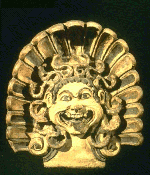 Gorgon, in Greek mythology, one of three monstrous daughters of
the sea god Phorcys and his wife, Ceto. The Gorgons were
terrifying, dragonlike creatures, covered with golden scales and
having snakes for hair. They lived on the farthest side of the
western ocean, shunned because their glance turned people to
stone. Two of the Gorgons, Stheno and Euryale, were immortal;
Medusa alone could be killed. The hero Perseus killed Medusa and
brought back her head, with the help of the deities Hermes and
Athena. From her blood sprang the winged horse Pegasus, her son
by the god Poseidon. Medusa used to be beautiful, or so I'm told.
Gorgon, in Greek mythology, one of three monstrous daughters of
the sea god Phorcys and his wife, Ceto. The Gorgons were
terrifying, dragonlike creatures, covered with golden scales and
having snakes for hair. They lived on the farthest side of the
western ocean, shunned because their glance turned people to
stone. Two of the Gorgons, Stheno and Euryale, were immortal;
Medusa alone could be killed. The hero Perseus killed Medusa and
brought back her head, with the help of the deities Hermes and
Athena. From her blood sprang the winged horse Pegasus, her son
by the god Poseidon. Medusa used to be beautiful, or so I'm told.
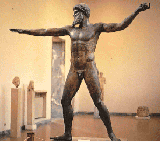 Neptune, in Roman mythology, god of the sea, son of the god
Saturn, and brother of Jupiter, king of the gods, and Pluto, god
of the dead. Originally a god of springs and streams, he became
identified with the Greek god of the sea, Poseidon. His festival
was celebrated on July 23. Poseidon, in Greek mythology, god of the sea, the son of the
Titans Cronus and Rhea, and the brother of Zeus and Hades.
Poseidon was the husband of Amphitrite, one of the Nereids, by
whom he had a son, Triton. Poseidon had numerous other love
affairs, however, especially with nymphs of springs and
fountains, and was the father of several children famed for
their wildness and cruelty, among them the giant Orion and the
Cyclops Polyphemus. Poseidon and the Gorgon Medusa were the
parents of Pegasus, the famous winged horse. Poseidon plays a
prominent part in numerous ancient myths and legends. He
contended unsuccessfully with Athena, goddess of wisdom, for the
control of Athens. When he and Apollo, god of the sun, were
cheated of their promised wages after having helped Laomedon,
king of Troy, build the walls of that city, Poseidon sent a
terrible sea monster to ravage the land, and during the Trojan
War he helped the Greeks. In art, Poseidon is represented as a
bearded and majestic figure, holding a trident and often
accompanied by a dolphin. Every two years the Isthmian Games,
featuring horse and chariot racers, were held in his honor at
Corinth. The Romans identified Poseidon with their god of the
sea, Neptune.
Neptune, in Roman mythology, god of the sea, son of the god
Saturn, and brother of Jupiter, king of the gods, and Pluto, god
of the dead. Originally a god of springs and streams, he became
identified with the Greek god of the sea, Poseidon. His festival
was celebrated on July 23. Poseidon, in Greek mythology, god of the sea, the son of the
Titans Cronus and Rhea, and the brother of Zeus and Hades.
Poseidon was the husband of Amphitrite, one of the Nereids, by
whom he had a son, Triton. Poseidon had numerous other love
affairs, however, especially with nymphs of springs and
fountains, and was the father of several children famed for
their wildness and cruelty, among them the giant Orion and the
Cyclops Polyphemus. Poseidon and the Gorgon Medusa were the
parents of Pegasus, the famous winged horse. Poseidon plays a
prominent part in numerous ancient myths and legends. He
contended unsuccessfully with Athena, goddess of wisdom, for the
control of Athens. When he and Apollo, god of the sun, were
cheated of their promised wages after having helped Laomedon,
king of Troy, build the walls of that city, Poseidon sent a
terrible sea monster to ravage the land, and during the Trojan
War he helped the Greeks. In art, Poseidon is represented as a
bearded and majestic figure, holding a trident and often
accompanied by a dolphin. Every two years the Isthmian Games,
featuring horse and chariot racers, were held in his honor at
Corinth. The Romans identified Poseidon with their god of the
sea, Neptune.
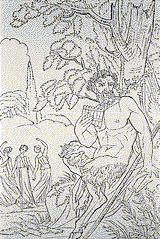 Pan, in Greek mythology, god of woods, fields, and fertility,
the son of Hermes, messenger of the gods, and a nymph. Part
animal, with the horns, hoofs, and ears of a goat, he was a
rollicking deity, the god of the shepherds and the goatherds. A
wonderful musician, he accompanied, with his pipe of reeds, the
woodland nymphs when they danced. He invented this pipe when the
nymph Syrinx, whom he was pursuing, was transformed into a bed
of reeds to escape him; Pan then took reeds of unequal length
and played on them. The god was always wooing one of the nymphs
by playing on his pipes, but was always rejected because of his
ugliness. Pan's haunts were the mountains and caves and all wild
places, but his favorite spot was Arcady, where he was born. The
word panic is supposed to have been derived from the fears of
travelers who heard the sound of his pipes at night in the
wilderness.
Pan, in Greek mythology, god of woods, fields, and fertility,
the son of Hermes, messenger of the gods, and a nymph. Part
animal, with the horns, hoofs, and ears of a goat, he was a
rollicking deity, the god of the shepherds and the goatherds. A
wonderful musician, he accompanied, with his pipe of reeds, the
woodland nymphs when they danced. He invented this pipe when the
nymph Syrinx, whom he was pursuing, was transformed into a bed
of reeds to escape him; Pan then took reeds of unequal length
and played on them. The god was always wooing one of the nymphs
by playing on his pipes, but was always rejected because of his
ugliness. Pan's haunts were the mountains and caves and all wild
places, but his favorite spot was Arcady, where he was born. The
word panic is supposed to have been derived from the fears of
travelers who heard the sound of his pipes at night in the
wilderness.
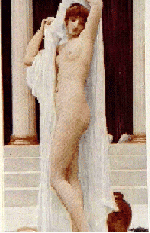 Psyche, in Roman mythology, beautiful princess loved by Cupid,
god of love. Jealous of Psyche's beauty, Venus, goddess of love,
ordered her son, Cupid, to make Psyche fall in love with the
ugliest man in the world. Fortunately for Psyche, Cupid instead
fell in love with her and carried her off to a secluded palace
where he visited her only by night, unseen and unrecognized by
her. Although Cupid had forbidden her ever to look upon his
face, one night Psyche lit a lamp and looked upon him while he
slept. Because she had disobeyed him, Cupid abandoned her, and
Psyche was left to wander desolately throughout the world in
search of him. Finally, after many trials she was reunited with
Cupid and was made immortal by Jupiter / Zeus, the king of the
gods.
Psyche, in Roman mythology, beautiful princess loved by Cupid,
god of love. Jealous of Psyche's beauty, Venus, goddess of love,
ordered her son, Cupid, to make Psyche fall in love with the
ugliest man in the world. Fortunately for Psyche, Cupid instead
fell in love with her and carried her off to a secluded palace
where he visited her only by night, unseen and unrecognized by
her. Although Cupid had forbidden her ever to look upon his
face, one night Psyche lit a lamp and looked upon him while he
slept. Because she had disobeyed him, Cupid abandoned her, and
Psyche was left to wander desolately throughout the world in
search of him. Finally, after many trials she was reunited with
Cupid and was made immortal by Jupiter / Zeus, the king of the
gods.
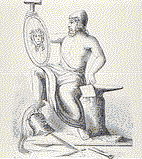 Vulcan ( Lat. Volcanus), in Roman mythology, the god of fire.
Originally an old Italian deity who seems to have been
associated with volcanic fire, Vulcan was identified with the
Greek god Hephaestus in classical times. At Rome his festival,
the Volcanalia, was celebrated on August 23. He was particularly
revered at Ostia, where his was the principal cult.
Vulcan ( Lat. Volcanus), in Roman mythology, the god of fire.
Originally an old Italian deity who seems to have been
associated with volcanic fire, Vulcan was identified with the
Greek god Hephaestus in classical times. At Rome his festival,
the Volcanalia, was celebrated on August 23. He was particularly
revered at Ostia, where his was the principal cult.
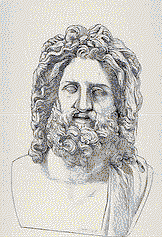 Zeus, in Greek mythology, the god of the sky and ruler of the
Olympian gods. Zeus corresponds to the Roman god Jupiter (q.v.)
Zeus was considered, according to Homer, the father of the
gods and of mortals. He did not create either gods or mortals;
he was their father in the sense of being the protector and
ruler both of the Olympian family and of the human race. He was
lord of the sky, the rain god, and the cloud gatherer, who
wielded the terrible thunderbolt. His breastplate was the aegis,
his bird the eagle, his tree the oak. Zeus presided over the
gods on Mount Olympus in Thessaly. His principal shrines were at
Dodona, in Epirus, the land of the oak trees and the most
ancient shrine, famous for its oracle, and at Olympia, where the
Olympian Games were celebrated in his honor every fourth year.
The Nemean games, held at Nemea, northwest of Argos, were also
dedicated to Zeus. Zeus was the youngest son of the Titans
(q.v.) Cronus and Rhea (qq.v.) and the brother of the deities
Poseidon , Hades , Hestia , Demeter , and Hera (qq.v.) .
According to one of the ancient myths of the birth of Zeus,
Cronus, fearing that he might be dethroned by one of his
children, swallowed them as they were born. Upon the birth of
Zeus, Rhea wrapped a stone in swaddling clothes for Cronus to
swallow and concealed the infant god in Crete, where he was fed
on the milk of the goat Amalthaea and reared by nymphs.
Zeus, in Greek mythology, the god of the sky and ruler of the
Olympian gods. Zeus corresponds to the Roman god Jupiter (q.v.)
Zeus was considered, according to Homer, the father of the
gods and of mortals. He did not create either gods or mortals;
he was their father in the sense of being the protector and
ruler both of the Olympian family and of the human race. He was
lord of the sky, the rain god, and the cloud gatherer, who
wielded the terrible thunderbolt. His breastplate was the aegis,
his bird the eagle, his tree the oak. Zeus presided over the
gods on Mount Olympus in Thessaly. His principal shrines were at
Dodona, in Epirus, the land of the oak trees and the most
ancient shrine, famous for its oracle, and at Olympia, where the
Olympian Games were celebrated in his honor every fourth year.
The Nemean games, held at Nemea, northwest of Argos, were also
dedicated to Zeus. Zeus was the youngest son of the Titans
(q.v.) Cronus and Rhea (qq.v.) and the brother of the deities
Poseidon , Hades , Hestia , Demeter , and Hera (qq.v.) .
According to one of the ancient myths of the birth of Zeus,
Cronus, fearing that he might be dethroned by one of his
children, swallowed them as they were born. Upon the birth of
Zeus, Rhea wrapped a stone in swaddling clothes for Cronus to
swallow and concealed the infant god in Crete, where he was fed
on the milk of the goat Amalthaea and reared by nymphs.
When Zeus grew to maturity, he forced Cronus to disgorge the
other children, who were eager to take vengeance on their
father. In the war that followed, the Titans fought on the side
of Cronus, but Zeus and the other gods were successful, and the
Titans were consigned to the abyss of Tartarus (q.v.) . Zeus
henceforth ruled over the sky, and his brothers Poseidon and
Hades were given power over the sea and the underworld,
respectively. The earth was to be ruled in common by all three.
Beginning with the writings of the Greek poet Homer, Zeus is
pictured in two very different ways. He is represented as the
god of justice and mercy, the protector of the weak, and the
punisher of the wicked.
As husband to his sister Hera, he is the father of Ares, the god
of war; Hebe, the goddess of youth; Hephaestus, the god of fire;
and Eileithyia, the goddess of childbirth. At the same time,
Zeus is described as falling in love with one woman after
another and resorting to all kinds of tricks to hide his
infidelity from his wife. Stories of his escapades were numerous
in ancient mythology, and many of his offspring were a result of
his love affairs with both goddesses and mortal women. It is
believed that, with the development of a sense of ethics in
Greek life, the idea of a lecherous, sometimes ridiculous father
god became distasteful, so later legends present Zeus in a more
exalted light. His many affairs with mortals are sometimes
explained as the wish of the early Greeks to trace their lineage
to him. Zeus' image was represented in sculptural works as a
kingly, bearded figure. The most celebrated of all statues of
Zeus was Phidias' gold and ivory colossus at Olympia.
 Go Back
to Shy David's Neo-Pagan Page.
Go Back
to Shy David's Neo-Pagan Page.

 Aphrodite, to the right and left here, is, of course, the
Goddess of Love and sexual desire, though there is an aspect of
her called "She who turns herself away" that is less than
pleasant. Aphrodite was often seen on battle fields, fighting
along side humans at the Battle for Troy. In Homer's Iliad she
is said to be the daughter of Zeus and Dione, one of his
consorts, but in later legends she is described as having sprung
from the foam of the sea and her name may be translated
"foam-risen." In Homeric legend Aphrodite is the wife of the
lame and ugly god of fire, Hephaestus. Among her lovers was
Ares, god of war, who in later mythology became her husband. She
was the rival of Persephone, queen of the underworld, for the
love of the beautiful Greek youth Adonis.
Aphrodite, to the right and left here, is, of course, the
Goddess of Love and sexual desire, though there is an aspect of
her called "She who turns herself away" that is less than
pleasant. Aphrodite was often seen on battle fields, fighting
along side humans at the Battle for Troy. In Homer's Iliad she
is said to be the daughter of Zeus and Dione, one of his
consorts, but in later legends she is described as having sprung
from the foam of the sea and her name may be translated
"foam-risen." In Homeric legend Aphrodite is the wife of the
lame and ugly god of fire, Hephaestus. Among her lovers was
Ares, god of war, who in later mythology became her husband. She
was the rival of Persephone, queen of the underworld, for the
love of the beautiful Greek youth Adonis.
 Perhaps the most
famous legend about Aphrodite concerns the cause of the Trojan
War. Eris, the goddess of discord, the only goddess not invited
to the wedding of King Peleus and the sea nymph Thetis,
resentfully tossed into the banquet hall a golden apple, marked
"for the fairest." When Zeus refused to judge between the three
goddesses who claimed the apple, Hera, Athena, and Aphrodite,
they asked Paris, prince of Troy, to make the award. Each
offered him a bribe: Hera, that he would be a powerful ruler;
Athena, that he would achieve great military fame; and
Aphrodite, that he should have the fairest woman in the world.
Paris selected Aphrodite as the fairest and chose as his prize
Helen of Troy, the wife of the Greek king Menelaus. Paris's
abduction of Helen led to the Trojan War. Probably Oriental in
origin, Aphrodite was identified in early Greek religious
beliefs with the Phoenician Astarte and was known as Aphrodite
Urania, queen of the heavens, and as Aphrodite Pandemos, goddess
of the people.
Perhaps the most
famous legend about Aphrodite concerns the cause of the Trojan
War. Eris, the goddess of discord, the only goddess not invited
to the wedding of King Peleus and the sea nymph Thetis,
resentfully tossed into the banquet hall a golden apple, marked
"for the fairest." When Zeus refused to judge between the three
goddesses who claimed the apple, Hera, Athena, and Aphrodite,
they asked Paris, prince of Troy, to make the award. Each
offered him a bribe: Hera, that he would be a powerful ruler;
Athena, that he would achieve great military fame; and
Aphrodite, that he should have the fairest woman in the world.
Paris selected Aphrodite as the fairest and chose as his prize
Helen of Troy, the wife of the Greek king Menelaus. Paris's
abduction of Helen led to the Trojan War. Probably Oriental in
origin, Aphrodite was identified in early Greek religious
beliefs with the Phoenician Astarte and was known as Aphrodite
Urania, queen of the heavens, and as Aphrodite Pandemos, goddess
of the people.
 To the left, Ares, the Greek god of war. Not a very nice guy,
all things considering. That's an awefully short (cough) "sword"
he's got there, don't you think? But I wouldn't tell him so to
his face: I might end up in the Elysium Fields or Hades pushing
a stone around for eternity. Ares is the son of Zeus (king of
the gods) and Hera. The Romans identified him with Mars, also a
god of war. Aggressive and sanguinary, Ares personified the
brutal nature of war. He was unpopular with both gods and
humans. Among the deities associated with Ares were his consort,
Aphrodite, goddess of love (see her below somewhere), and such
minor deities as Deimos (Fear) and Phobos (Rout), who
accompanied him in battle. Although fierce and warlike, Ares was
not invincible, even against mortals. The worship of Ares,
believed to have originated in Thrace, was not extensive in
ancient Greece, and where it existed, it lacked social or moral
significance. Ares was an ancestral deity of Thebes and had a
temple at Athens, at the foot of the Areopagus, or "Hill of
Ares." He's also the handsom chap giving Hercules a hard time
in the TV series.
To the left, Ares, the Greek god of war. Not a very nice guy,
all things considering. That's an awefully short (cough) "sword"
he's got there, don't you think? But I wouldn't tell him so to
his face: I might end up in the Elysium Fields or Hades pushing
a stone around for eternity. Ares is the son of Zeus (king of
the gods) and Hera. The Romans identified him with Mars, also a
god of war. Aggressive and sanguinary, Ares personified the
brutal nature of war. He was unpopular with both gods and
humans. Among the deities associated with Ares were his consort,
Aphrodite, goddess of love (see her below somewhere), and such
minor deities as Deimos (Fear) and Phobos (Rout), who
accompanied him in battle. Although fierce and warlike, Ares was
not invincible, even against mortals. The worship of Ares,
believed to have originated in Thrace, was not extensive in
ancient Greece, and where it existed, it lacked social or moral
significance. Ares was an ancestral deity of Thebes and had a
temple at Athens, at the foot of the Areopagus, or "Hill of
Ares." He's also the handsom chap giving Hercules a hard time
in the TV series.

 Artemis, in Greek mythology, one of the principal goddesses,
counterpart of the Roman goddess Diana. She was the daughter of
the god Zeus and Leto and the twin sister of the god Apollo. She
was chief hunter to the gods and goddess of hunting and of wild
animals, especially bears. Artemis was also the goddess of
childbirth, of nature, and of the harvest. As the moon goddess,
she was sometimes identified with the goddess Selene and Hecate.
Although traditionally the friend and protector of youth,
especially young women, Artemis prevented the Greeks from
sailing to Troy during the Trojan war until they sacrificed a
maiden to her. According to some accounts, just before the
sacrifice, she rescued the victim, Iphigenia. Like Apollo,
Artemis was armed with a bow and arrows, which she often used to
punish mortals who angered her. In other legends, she is praised
for giving young women who died in childbirth a swift and
painless death.
Artemis, in Greek mythology, one of the principal goddesses,
counterpart of the Roman goddess Diana. She was the daughter of
the god Zeus and Leto and the twin sister of the god Apollo. She
was chief hunter to the gods and goddess of hunting and of wild
animals, especially bears. Artemis was also the goddess of
childbirth, of nature, and of the harvest. As the moon goddess,
she was sometimes identified with the goddess Selene and Hecate.
Although traditionally the friend and protector of youth,
especially young women, Artemis prevented the Greeks from
sailing to Troy during the Trojan war until they sacrificed a
maiden to her. According to some accounts, just before the
sacrifice, she rescued the victim, Iphigenia. Like Apollo,
Artemis was armed with a bow and arrows, which she often used to
punish mortals who angered her. In other legends, she is praised
for giving young women who died in childbirth a swift and
painless death.

 Dionysus, in Greek mythology, god of wine and vegetation, who
showed mortals how to cultivate grapevines and make wine. He was
good and gentle to those who honored him, but he brought madness
and destruction upon those who spurned him or the orgiastic
rituals of his cult. According to tradition, Dionysus died each
winter and was reborn in the spring. To his followers, this
cyclical revival, accompanied by the seasonal renewal of the
fruits of the earth, embodied the promise of the resurrection of
the dead. The yearly rites in honor of the resurrection of
Dionysus gradually evolved into the structured form of the Greek
drama, and important festivals were held in honor of the god,
during which great dramatic competitions were conducted. The
most important festival, the Greater Dionysia, was held in
Athens for five days each spring. It was for this celebration
that the Greek dramatists Aeschylus, Sophocles, and Euripides
wrote their great tragedies. After the 5th century bc , Dionysus
was known to the Greeks as Bacchus.
Dionysus, in Greek mythology, god of wine and vegetation, who
showed mortals how to cultivate grapevines and make wine. He was
good and gentle to those who honored him, but he brought madness
and destruction upon those who spurned him or the orgiastic
rituals of his cult. According to tradition, Dionysus died each
winter and was reborn in the spring. To his followers, this
cyclical revival, accompanied by the seasonal renewal of the
fruits of the earth, embodied the promise of the resurrection of
the dead. The yearly rites in honor of the resurrection of
Dionysus gradually evolved into the structured form of the Greek
drama, and important festivals were held in honor of the god,
during which great dramatic competitions were conducted. The
most important festival, the Greater Dionysia, was held in
Athens for five days each spring. It was for this celebration
that the Greek dramatists Aeschylus, Sophocles, and Euripides
wrote their great tragedies. After the 5th century bc , Dionysus
was known to the Greeks as Bacchus.
 Gorgon, in Greek mythology, one of three monstrous daughters of
the sea god Phorcys and his wife, Ceto. The Gorgons were
terrifying, dragonlike creatures, covered with golden scales and
having snakes for hair. They lived on the farthest side of the
western ocean, shunned because their glance turned people to
stone. Two of the Gorgons, Stheno and Euryale, were immortal;
Medusa alone could be killed. The hero Perseus killed Medusa and
brought back her head, with the help of the deities Hermes and
Athena. From her blood sprang the winged horse Pegasus, her son
by the god Poseidon. Medusa used to be beautiful, or so I'm told.
Gorgon, in Greek mythology, one of three monstrous daughters of
the sea god Phorcys and his wife, Ceto. The Gorgons were
terrifying, dragonlike creatures, covered with golden scales and
having snakes for hair. They lived on the farthest side of the
western ocean, shunned because their glance turned people to
stone. Two of the Gorgons, Stheno and Euryale, were immortal;
Medusa alone could be killed. The hero Perseus killed Medusa and
brought back her head, with the help of the deities Hermes and
Athena. From her blood sprang the winged horse Pegasus, her son
by the god Poseidon. Medusa used to be beautiful, or so I'm told.
 Neptune, in Roman mythology, god of the sea, son of the god
Saturn, and brother of Jupiter, king of the gods, and Pluto, god
of the dead. Originally a god of springs and streams, he became
identified with the Greek god of the sea, Poseidon. His festival
was celebrated on July 23. Poseidon, in Greek mythology, god of the sea, the son of the
Titans Cronus and Rhea, and the brother of Zeus and Hades.
Poseidon was the husband of Amphitrite, one of the Nereids, by
whom he had a son, Triton. Poseidon had numerous other love
affairs, however, especially with nymphs of springs and
fountains, and was the father of several children famed for
their wildness and cruelty, among them the giant Orion and the
Cyclops Polyphemus. Poseidon and the Gorgon Medusa were the
parents of Pegasus, the famous winged horse. Poseidon plays a
prominent part in numerous ancient myths and legends. He
contended unsuccessfully with Athena, goddess of wisdom, for the
control of Athens. When he and Apollo, god of the sun, were
cheated of their promised wages after having helped Laomedon,
king of Troy, build the walls of that city, Poseidon sent a
terrible sea monster to ravage the land, and during the Trojan
War he helped the Greeks. In art, Poseidon is represented as a
bearded and majestic figure, holding a trident and often
accompanied by a dolphin. Every two years the Isthmian Games,
featuring horse and chariot racers, were held in his honor at
Corinth. The Romans identified Poseidon with their god of the
sea, Neptune.
Neptune, in Roman mythology, god of the sea, son of the god
Saturn, and brother of Jupiter, king of the gods, and Pluto, god
of the dead. Originally a god of springs and streams, he became
identified with the Greek god of the sea, Poseidon. His festival
was celebrated on July 23. Poseidon, in Greek mythology, god of the sea, the son of the
Titans Cronus and Rhea, and the brother of Zeus and Hades.
Poseidon was the husband of Amphitrite, one of the Nereids, by
whom he had a son, Triton. Poseidon had numerous other love
affairs, however, especially with nymphs of springs and
fountains, and was the father of several children famed for
their wildness and cruelty, among them the giant Orion and the
Cyclops Polyphemus. Poseidon and the Gorgon Medusa were the
parents of Pegasus, the famous winged horse. Poseidon plays a
prominent part in numerous ancient myths and legends. He
contended unsuccessfully with Athena, goddess of wisdom, for the
control of Athens. When he and Apollo, god of the sun, were
cheated of their promised wages after having helped Laomedon,
king of Troy, build the walls of that city, Poseidon sent a
terrible sea monster to ravage the land, and during the Trojan
War he helped the Greeks. In art, Poseidon is represented as a
bearded and majestic figure, holding a trident and often
accompanied by a dolphin. Every two years the Isthmian Games,
featuring horse and chariot racers, were held in his honor at
Corinth. The Romans identified Poseidon with their god of the
sea, Neptune.
 Pan, in Greek mythology, god of woods, fields, and fertility,
the son of Hermes, messenger of the gods, and a nymph. Part
animal, with the horns, hoofs, and ears of a goat, he was a
rollicking deity, the god of the shepherds and the goatherds. A
wonderful musician, he accompanied, with his pipe of reeds, the
woodland nymphs when they danced. He invented this pipe when the
nymph Syrinx, whom he was pursuing, was transformed into a bed
of reeds to escape him; Pan then took reeds of unequal length
and played on them. The god was always wooing one of the nymphs
by playing on his pipes, but was always rejected because of his
ugliness. Pan's haunts were the mountains and caves and all wild
places, but his favorite spot was Arcady, where he was born. The
word panic is supposed to have been derived from the fears of
travelers who heard the sound of his pipes at night in the
wilderness.
Pan, in Greek mythology, god of woods, fields, and fertility,
the son of Hermes, messenger of the gods, and a nymph. Part
animal, with the horns, hoofs, and ears of a goat, he was a
rollicking deity, the god of the shepherds and the goatherds. A
wonderful musician, he accompanied, with his pipe of reeds, the
woodland nymphs when they danced. He invented this pipe when the
nymph Syrinx, whom he was pursuing, was transformed into a bed
of reeds to escape him; Pan then took reeds of unequal length
and played on them. The god was always wooing one of the nymphs
by playing on his pipes, but was always rejected because of his
ugliness. Pan's haunts were the mountains and caves and all wild
places, but his favorite spot was Arcady, where he was born. The
word panic is supposed to have been derived from the fears of
travelers who heard the sound of his pipes at night in the
wilderness.
 Psyche, in Roman mythology, beautiful princess loved by Cupid,
god of love. Jealous of Psyche's beauty, Venus, goddess of love,
ordered her son, Cupid, to make Psyche fall in love with the
ugliest man in the world. Fortunately for Psyche, Cupid instead
fell in love with her and carried her off to a secluded palace
where he visited her only by night, unseen and unrecognized by
her. Although Cupid had forbidden her ever to look upon his
face, one night Psyche lit a lamp and looked upon him while he
slept. Because she had disobeyed him, Cupid abandoned her, and
Psyche was left to wander desolately throughout the world in
search of him. Finally, after many trials she was reunited with
Cupid and was made immortal by Jupiter / Zeus, the king of the
gods.
Psyche, in Roman mythology, beautiful princess loved by Cupid,
god of love. Jealous of Psyche's beauty, Venus, goddess of love,
ordered her son, Cupid, to make Psyche fall in love with the
ugliest man in the world. Fortunately for Psyche, Cupid instead
fell in love with her and carried her off to a secluded palace
where he visited her only by night, unseen and unrecognized by
her. Although Cupid had forbidden her ever to look upon his
face, one night Psyche lit a lamp and looked upon him while he
slept. Because she had disobeyed him, Cupid abandoned her, and
Psyche was left to wander desolately throughout the world in
search of him. Finally, after many trials she was reunited with
Cupid and was made immortal by Jupiter / Zeus, the king of the
gods.
 Vulcan ( Lat. Volcanus), in Roman mythology, the god of fire.
Originally an old Italian deity who seems to have been
associated with volcanic fire, Vulcan was identified with the
Greek god Hephaestus in classical times. At Rome his festival,
the Volcanalia, was celebrated on August 23. He was particularly
revered at Ostia, where his was the principal cult.
Vulcan ( Lat. Volcanus), in Roman mythology, the god of fire.
Originally an old Italian deity who seems to have been
associated with volcanic fire, Vulcan was identified with the
Greek god Hephaestus in classical times. At Rome his festival,
the Volcanalia, was celebrated on August 23. He was particularly
revered at Ostia, where his was the principal cult.
 Zeus, in Greek mythology, the god of the sky and ruler of the
Olympian gods. Zeus corresponds to the Roman god Jupiter (q.v.)
Zeus was considered, according to Homer, the father of the
gods and of mortals. He did not create either gods or mortals;
he was their father in the sense of being the protector and
ruler both of the Olympian family and of the human race. He was
lord of the sky, the rain god, and the cloud gatherer, who
wielded the terrible thunderbolt. His breastplate was the aegis,
his bird the eagle, his tree the oak. Zeus presided over the
gods on Mount Olympus in Thessaly. His principal shrines were at
Dodona, in Epirus, the land of the oak trees and the most
ancient shrine, famous for its oracle, and at Olympia, where the
Olympian Games were celebrated in his honor every fourth year.
The Nemean games, held at Nemea, northwest of Argos, were also
dedicated to Zeus. Zeus was the youngest son of the Titans
(q.v.) Cronus and Rhea (qq.v.) and the brother of the deities
Poseidon , Hades , Hestia , Demeter , and Hera (qq.v.) .
According to one of the ancient myths of the birth of Zeus,
Cronus, fearing that he might be dethroned by one of his
children, swallowed them as they were born. Upon the birth of
Zeus, Rhea wrapped a stone in swaddling clothes for Cronus to
swallow and concealed the infant god in Crete, where he was fed
on the milk of the goat Amalthaea and reared by nymphs.
Zeus, in Greek mythology, the god of the sky and ruler of the
Olympian gods. Zeus corresponds to the Roman god Jupiter (q.v.)
Zeus was considered, according to Homer, the father of the
gods and of mortals. He did not create either gods or mortals;
he was their father in the sense of being the protector and
ruler both of the Olympian family and of the human race. He was
lord of the sky, the rain god, and the cloud gatherer, who
wielded the terrible thunderbolt. His breastplate was the aegis,
his bird the eagle, his tree the oak. Zeus presided over the
gods on Mount Olympus in Thessaly. His principal shrines were at
Dodona, in Epirus, the land of the oak trees and the most
ancient shrine, famous for its oracle, and at Olympia, where the
Olympian Games were celebrated in his honor every fourth year.
The Nemean games, held at Nemea, northwest of Argos, were also
dedicated to Zeus. Zeus was the youngest son of the Titans
(q.v.) Cronus and Rhea (qq.v.) and the brother of the deities
Poseidon , Hades , Hestia , Demeter , and Hera (qq.v.) .
According to one of the ancient myths of the birth of Zeus,
Cronus, fearing that he might be dethroned by one of his
children, swallowed them as they were born. Upon the birth of
Zeus, Rhea wrapped a stone in swaddling clothes for Cronus to
swallow and concealed the infant god in Crete, where he was fed
on the milk of the goat Amalthaea and reared by nymphs.